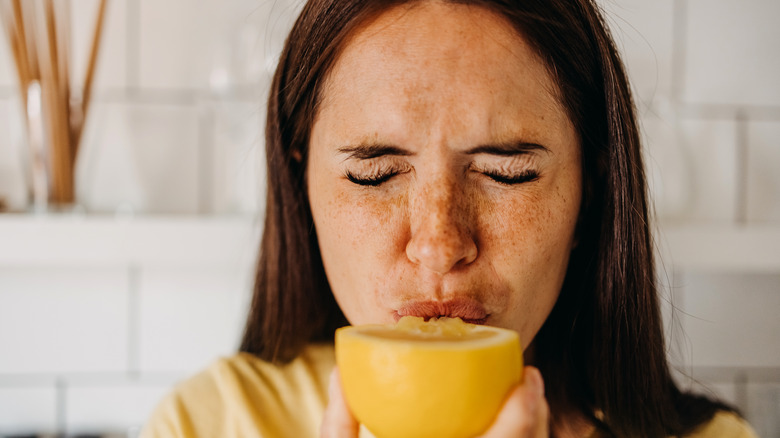Avoid Eating Lemons If This Is Happening To Your Mouth
Every so often, we see yet another adorable viral video making the rounds on social media of a baby scrunching up their face after tasting a sour lemon slice. Because lemons have such a strong taste, most of us aren't munching on them as a snack. It doesn't mean the fruit doesn't work its way into our diet, however, as lemon slices are often used as a garnish in cocktails or paired with certain dishes for added flavor. (Lemon pepper chicken, anyone?) Still, even if you're not chowing down on a whole lemon, you may want to steer clear of lemon slices if you're waiting on a mouth ulcer to heal.
Most often red, yellow, or white in color, mouth ulcers are sores that can develop anywhere from the insides of the cheeks to the gums, tongue, bottom lip, and more, explains the Cleveland Clinic. While there are different types of mouth ulcers — some of which are related to certain health conditions — most of us are familiar with canker sores. Unfortunately, it doesn't take much for these painful lesions to form. Sometimes all it takes is accidentally biting down on your inner cheek a little too hard while chewing. Ouch!
The acidity of lemons may aggravate mouth ulcers
According to InformedHealth.org, an estimated 1 in every 10 people experiences canker sores. For these individuals, eating certain foods may only make symptoms worse. Lemons are one such food to avoid if you're currently dealing with mouth ulcers due to the fruit's acid content. The delicate tissue inside our mouths is sensitive, and acidic fruits can prompt irritation, according to experts at Dentistry of West Bend. So much so that not only may eating lemons aggravate existing mouth ulcers, but they may cause new ones to form, too. Along with lemons, you'll also want to hold off on eating any other citrus fruits for the time being, including pineapple, grapefruit, and oranges.
So how long should you wait before you can safely enjoy your daily glass of lemon water again? The Cleveland Clinic suggests giving it about ten to 14 days, which is approximately how long it takes for mouth ulcers to heal. However, if you have a canker sore that stubbornly sticks around for more than three weeks, reach out to your doctor.
Potential complications of mouth ulcers
In addition to avoiding lemons and other citrus fruits, you'll want to stay hydrated and keep up with regular brushing and flossing to accelerate healing. To help relieve the pain of a mouth ulcer, try using a warm saltwater rinse three times a day, and swish and spit with a mixture of hydrogen peroxide and water twice daily, suggests the Cleveland Clinic. Numbing products like Orajel or Anbesol can also be helpful.
While most mouth ulcers resolve on their own, there are instances in which these lesions can lead to complications (such as tooth abscesses or cellulitis of the mouth) should the sore develop a bacterial infection, explains MedlinePlus. While rare, mouth ulcers that do not improve may be one of many potential signs of oral cancer. In such cases, oral cancer-related mouth ulcers most often affect the tongue. Talk to your physician if mouth ulcers are not healing, become recurrent, or if you develop any other unusual symptoms.



